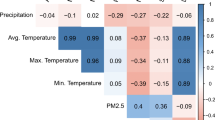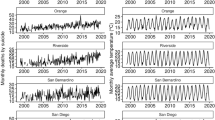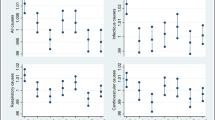Abstract
Adverse mental health outcomes have been associated with high temperatures in studies worldwide. Few studies explore a broad range of mental health outcomes, and to our knowledge, none are specific to NC, USA. This ecological study explored the relationship between ambient temperature and mental health outcomes (suicide, self-harm and suicide ideation, anxiety and stress, mood disorders, and depression) in six urban counties across the state of NC, USA. We applied a quasi-Poisson generalized linear model combined with a distributed lag nonlinear model (DLNM) to examine the short-term effects of daily ambient temperature on emergency admissions for mental health conditions (2016 to 2018) and violent deaths (2004 to 2018). The results were predominately insignificant, with some key exceptions. The county with the greatest temperature range (Wake) displays higher levels of significance, while counties with the lowest temperature ranges (New Hanover and Pitt) are almost entirely insignificant. Self-harm and suicidal ideation peak in the warm months (July) and generally exhibit a protective effect at lower temperatures and shorter lag intervals. Whereas anxiety, depression, and major depressive disorders peak in the cooler months (May and September). Suicide is the only outcome that favored a 20-day lag period in the sensitivity analysis, although the association with temperature was insignificant. Our findings suggest additional research is needed across a suite of mental health outcomes to fully understand the effects of temperatures on mental health.









Similar content being viewed by others
Data Availability
Data is not available per data-use agreement.
References
Aguglia A, Giacomini G, Montagna E, Amerio A, Escelsior A, Capello M et al (2021) Meteorological variables and suicidal behavior: air pollution and apparent temperature are associated with high-lethality suicide attempts and male gender. Front Psych 12:653390
American Psychological Association (2022) US Youth are in a mental health crisis - we must invest in their care. Available at: https://www.apa.org/news/press/op-eds/youth-mental-health-crisis. Accessed 1 Jan 2022
Anderson CA, Delisi M (2011) Implications of global climate change for violence in developed and developing countries. In: Forgas J, Kruglanski A, Williams K (eds) The psychology of social conflict and aggression. New York, pp 249–265
Basu R, Gavin L, Pearson D, Ebisu K, Malig B (2018) Examining the association between apparent temperature and mental health-related emergency room visits in California. Am J of Epidemiol. https://doi.org/10.1093/AJE/KWX295
Bolton JM, Gunnell D, Turecki G (2015) Suicide risk assessment and intervention in people with mental illness. BMJ. https://doi.org/10.1136/BMJ.H4978
Bouchama A, Dehbi M, Mohamed G et al (2007) Prognostic factors in heat wave-related deaths: a meta-analysis. Arch Intern Med. https://doi.org/10.1001/archinte.167.20.ira70009
Bunker A, Wildenhain J, Vandenbergh A, Henschke N, Rocklöv J, Hajat S, Sauerborn R (2016) Effects of air temperature on climate-sensitive mortality and morbidity outcomes in the elderly; a systematic review and meta-analysis of epidemiological evidence. EBioMedicine 6:258–268
Butke P, Sheridan SC (2010) An analysis of the relationship between weather and aggressive crime in Cleveland. Ohio Weather Clim and Soc. https://doi.org/10.1175/2010WCAS1043.1
Centers for Disease Control (2018) Suicide prevention strategic plan. https://www.cdc.gov/suicide/strategy/index.html. Accessed 3 March 2022
Chern Y-R, Wu C-D, Pan W-C, Chen M-J et al (2016) Spatial correlation analysis of elderly suicides and urban heat island effects: an ecological study in Taipei, 2000–2008. Taiwan J Pub Health. https://doi.org/10.6288/TJPH201635104089
Dixon PG, McDonald AN, Scheitlin KN, Stapleton JE, Allen JS, Carter WM, Holley MR, Inman DD, Roberts JB (2007) Effects of temperature variation on suicide in five U.S. counties, 1991–2001. Int J of Biometeorol. https://doi.org/10.1007/S00484-006-0081-4
Dixon PG, Kalkstein AJ (2018) Where are weather-suicide associations valid? An examination of nine US counties with varying seasonality. Int J Biometeorol 62:685–697
Dodgen D, Donato D, Kelly N, Greca AL, Morganstein J, Reser J, Ruzek J, Schweitzer S, Shimamoto MM, Tart KT, Ursano R (2016) Mental health and well-being. In: The Impacts of Climate Change on Human Health in the United States: A Scientific Assessment. Washington, DC, pp 217–246. https://doi.org/10.7930/J0TX3C9H
Dudley MJ, Kelk NJ, Florio TM, Howard JP, Waters BGH (1998) Suicide among young Australians, 1964–1993: an interstate comparison of metropolitan and rural trends. Med J Aust 169:77–80
Dumenčić B, Rajc J, Marjanović K, Požgain I, Pavoković D (2019) Impact of meteorological factors on suicide attempts and completed suicides in Croatia. Osijek-Baranja County Psychiatria Danubina 31(4):405–412
Durkheim E (1951) Suicide: a study in sociology. Translated by JA Spaulding and G. Simpson (Glencoe, Illinois: The Free Press, 1951)
Frankson R, Kunkel KE, Stevens LE, Easterling DR, Sweet W, Wootten A, Aldridge H, Boyles R, Rayne S (2022) North Carolina State Climate Summary 2022. https://statesummaries.ncics.org/chapter/nc/. Accessed 25 April 2022
Gabreab, S (2018) Statistical methods in spatial epidemiology. In: Duncan D, Kawachi I (eds) Neighborhoods and Health, 2nd edn. New York, New York. pp 91–130. https://doi.org/10.1093/oso/9780190843496.003.0004
Gao J, Sun Y, Liu Q, Zhou M, Lu Y, Li L (2015) Impact of extreme high temperature of mortality and regional level definition of heat wave: a multi-city study in China. Sci Total Environ. https://doi.org/10.1016/j.scitotenv.2014.10.028
Gao J, Cheng Q, Duan J, Xu Z, Bai L, Zhang Y, ... Su H (2019) Ambient temperature, sunlight duration, and suicide: a systematic review and meta-analysis. Sci Total Environ 646:1021–1029
Gasparrini A (2010) Distributed lag non-linear models. Stat in Med. https://doi.org/10.1002/sim.3940
Gasparrini A (2011) Distributed lag linear and non-linear models in R: the package dlnm. J Stat Softw. https://doi.org/10.18637/jss.v043.i08
Gasparrini A (2022) A tutorial on the case time series design for small-area analysis. BMC Med Res Methodol 22(1):1–8
Guo Y, Barnett AG, Pan X, Yu W, Tong S (2011) The impact of temperature on mortality in Tianjin, China: a case-crossover design with a distributed lag nonlinear model. Environ Health Perspect 119(12):1719–1725
Guo P, Zheng M, Feng W, Wu J, Deng C, Luo G, Wang L, Pan B, Liu H (2017) Effects of ambient temperature on stroke hospital admissions: results from a time-series analysis of 104,432 strokes in Guangzhou. China Environ Health Perspect. https://doi.org/10.1016/j.scitotenv.2016.11.093
Hansen A, Bi P, Nitschke M, Ryan P, Pisaniello D, Tucker G (2008) The effect of heat waves on mental health in a temperate Australian city. Environ Health Perspect. https://doi.org/10.1289/ehp.11339
Hyndman RJ, Khandaka Y (2008) Automatic time series forecasting: the forecast package for R. J Stat Softw. https://doi.org/10.18637/jss.v027.i03
Ising A, Li M, Deyneka L, Vaughan-Batten H, Waller A (2011) Improving syndromic surveillance for nonpower users: NC DETECT dashboards. Emerg Health Treat J. https://doi.org/10.3402/ehtj.v4i0.11033
Ji J, Dleinman A, Becker AE (2001) Suicide in contemporary China: a review of China’s distinctive suicide demographics in their sociocultural context. Harv Rev Psychiatr. https://doi.org/10.1080/hrp.9.1.1.12
Kaiser R, Rubin CH, Henderson AK, Wolfe MI, Kieszak S, Parrott CL, Adcock M (2001) Heat-related death and mental illness during the 1999 Cincinnati heat wave. Am J Forensic Med Pathol. https://doi.org/10.1097/00000433-200109000-00022
Khalaj B, Glenis L, Sheppeard V, Dear K (2010) The health impacts of heat waves in five regions of New South Wales, Australia: a case-only analysis. Int Arch Occup Environ Health. https://doi.org/10.1007/s00420-010-0534-2
Kim C, Jung SH, Kang DR, Kim HC, Moon KT et al (2010) Ambient particulate matter as a risk factor for suicide. Am J Psychiatr. https://doi.org/10.1176/appi.ajp.2010.09050706
Kim Y, Kim H, Kim D-S (2011) Association between daily environmental temperature and suicide mortality in Korea (2001–2005). Psychiatr Res. https://doi.org/10.1016/J.PSYCHRES.2010.08.006
Kim SYH, de Vries RG, Peteet JR (2016) Euthanasia and assisted suicide of patients with psychiatric disorders in the Netherlands 2011 to 2014. JAMA Psychiatr. https://doi.org/10.1001/JAMAPSYCHIATRY.2015.2887
Kim Y, Kim H, Gasparrini A, Armstrong B, Honda Y, Chung Y et al (2019) Suicide and ambient temperature: a multi-country multi-city study. Environ Health Perspect. https://doi.org/10.1289/EHP4898
Lee S, Lee H, Myung W, Kim EJ, Kim H (2018) Mental disease-related emergency admission attributable to hot temperatures. Sci Total Environ. https://doi.org/10.1016/j.scitotenv.2017.10.260
Lim Y-H, Kim H, Kim JH, Bae S, Park HY, Hong Y-C (2012) Air pollution and symptoms of depression in elderly adults. Environ Health Perspect. https://doi.org/10.1289/ehp.1104100
Liu, J., Varghese, B. M., Hansen, A., Xiang, J., Zhang, Y., Dear, K., ... & Bi, P. (2021). Is there an association between hot weather and poor mental health outcomes? A systematic review and meta-analysis. Environment international, 153, 106533.
Ljubičića Đ, Stipčevićb T, Pivacb N, Jakovljevićc MJ, Mück-Šelerb D (2007) The influence of daylight exposure on platelet 5-HT levels in patients with major depression and schizophrenia. J Photochem Photobiol B: Biol. https://doi.org/10.1016/j.jphotobiol.2007.09.002
Ma W, Wang L, Lin H, Liu T, Zhang Y, Rutherford S, Luo Y, Zeng W, Zhang Y, Wang X, Gu X, Chu C, Xiao J, Zhou M (2015) The temperature-mortality relationship in China: an analysis from 66 Chinese communities. Envron Res. https://doi.org/10.1016/J.ENVRES.2014.11.016
Martin-Latry K, Goumy M-P, Latry P, Gabinski C, Bégaud B, Faure I, Verdoux H (2007) Psychotropic drugs use and risk of heat-related hospitalization. Eur Psychiatry. https://doi.org/10.1016/j.eurpsy.2007.03.007
Noelke C, McGovern M, Corsi DJ, Jiminez MP, Stern A, Wing IS, Berksman L (2016) Increasing ambient temperature reduces emotional well-being. Environ Res. https://doi.org/10.1016/j.envres.2016.06.045
Nori-Sarma A, Sun S, Sun Y et al (2022) Association between ambient heat and risk of emergency department visits for mental health among US adults, 2010 to 2019. JAMA Psychiat. https://doi.org/10.1001/jamapsychiatry.2021.4369
Nutsford D, Pearson AL, Kingham S (2013) An ecological study investigating the association between access to urban green space and mental health. Public Health. https://doi.org/10.1016/j.puhe.2013.08.016
Ogawa S, Fujii T, Koga N, Hori H, Teraishi T, Hattori K, Noda T, Higuchi T, Motohashi N, Kunugi H (2014) Plasma L-tryptophan concentration in major depressive disorder: new data and meta-analysis. J Clin Psychiatry. https://doi.org/10.4088/JCP.13r08908
Olfson M, Wall M, Wang S, Crystal S, Bridge JA, Liu S-M, Blanco C (2018) Suicide after deliberate self-harm in adolescents and young adults. Pediatrics. https://doi.org/10.1542/peds.2017-3517
Page LA, Howard LM (2010) The impact of climate change on mental health (but will mental health be discussed at Copenhagen?). Psychol Med. https://doi.org/10.1017/S0033291709992169
Peng Z, Wang Q, Kan H, Chen R, Wang W (2017) Effects of ambient temperature on daily hospital admissions for mental disorders in Shanghai, China: a time-series analysis. Sci Total Environ 5:52. https://doi.org/10.1016/J.SCITOTENV.2017.02.237
Petridou E, Papadopoulos F, Frangakis C, Stalkidou A, Trichopoulos D (2002) A role of sunshine in the triggering of suicide. Epidemiol 13(1):106–109
Preti A, Miotto P (1998) Seasonality in suicides: the influence of suicide method, gender, and age on suicide distribution in Italy. Psychiatry Res. https://doi.org/10.1016/S0165-1781(98)00099-7
Pun VC, Manjourides J, Suh H (2017) Association of ambient air pollution with depressive and anxiety symptoms in older adults: results from the NSHAP study. Environ Health Perspect. https://doi.org/10.1289/EHP494
Qi X, Tong S, Hu W (2009) Preliminary spatiotemporal analysis of the association between socio-environmental factors and suicide. Environ Health. https://doi.org/10.1186/1476-069X-8-46
Rocklov J, Barnett AG, Woodward A (2012) On the estimation of heat-intensity and the heat-duration effects in time series models of temperature-related mortality in Stockholm. Environ Health, Sweden. https://doi.org/10.1186/1476-069X-11-23
Runkle JD, Cui C, Fuhrmann C, Stevens S, Del Pinal J, Sugg MM (2019) Evaluation of wearable sensors for physiologic monitoring of individually experienced temperatures in outdoor workers in southeastern US. Environ Int 129:229–238
Santurtún A, Almendra R, Silva GL, Fdez-Arroyabe P, Santurtún M, Santana P (2020) Suicide and apparent temperature in the two capitals cities in the iberian peninsula. Soc Sci Med 265:113411
Semenza JC, McCullough JE, Flanders WD, McGeehin MA, Lumpkin JR (1999) Excess hospital admissions during the July 1995 heat wave in Chicago. Am J Prev Med. https://doi.org/10.1016/S0749-3797(99)00025-2
Shiloh R, Weizman A, Epstein Y, Rosenberg S-L, Valevski A, Dorfman-Etrog P, Wiezer N, Katz N, Munitz H, Hermesh H (2001) Abnormal thermoregulation in drug-free male schizophrenia patients. Eur Neuropsychopharmacol. https://doi.org/10.1016/S0924-977X(01)00096-7
Sugg MM, Konrad CE, Fuhrmann CM (2016) Relationships between maximum temperature and heat-related illness across North Carolina, USA. Int J Biometeorol 60:663–675
Sugg MM, Fuhrmann CM, Runkle JD (2018) Temporal and spatial variation in personal ambient temperatures for outdoor working populations in the southeastern USA. Int J Biometeorol 62:1521–1534
Sugg MM, Dixon PG, Runkle JD (2019) Crisis support-seeking behavior and temperature in the United States: is there an association in young adults and adolescents? Sci Total Environ. https://doi.org/10.1016/J.SCITOTENV.2019.02.434
Sugg MM, Runkle JD, Dow K, Barnes J, Stevens S, Pearce J, ... Curtis S (2022) Individually experienced heat index in a coastal Southeastern US city among an occupationally exposed population. Int J Biometeorol 66(8):1665–1681
Sung T-I, Chen M-J, Lin C-Y, Lung S-C, Su H-J (2011) Relationship between mean daily ambient temperature range and hospital admissions for schizophrenia: results from a national cohort of psychiatric inpatients. Sci Total Environ. https://doi.org/10.1016/j.scitotenv.2011.09.028
Thompson R, Hornigold R, Page L, Waite T (2018) Associations between high ambient temperatures and heat waves with mental health outcomes: a systematic review. Public Health 161:171–191
Tost H, Champagne FA, Meyer-Lindenberg A (2015) Environmental influence in the brain, human welfare and mental health. Nat Neurosci. https://doi.org/10.1038/nn.4108
Vida S, Durocher M, Ouarda TBMJ, Gosselin P (2012) Relationship between ambient temperature and humidity and visits to mental health emergency departments in Québec. Psychiatr Serv. https://doi.org/10.1176/appi.ps.201100485
Vose RS, Applequist S, Squires M, Durre I, Menne MJ et al (2014) Improved historical temperature and precipitation time series for US climate divisions. J Appl Meteorol Clim. https://doi.org/10.1175/JAMC-D-13-0248.1
Wang X, Lavigne E, Ouellette-kunts H, Chen BE (2014) Acute impacts of extreme temperature exposure on emergency room admissions related to mental and behavior disorders in Toronto. Canada J Affect Disord. https://doi.org/10.1016/J.JAD.2013.10.042
Wortzel JR, Norden JG, Turner BE, Haynor DR, Kent ST, Al-Hamdan MZ, Avery DH, Norden MJ (2019) Ambient temperature and solar insolation are associated with decreased prevalence of SSRI-treated psychiatric disorders. J Psychiatr Res. https://doi.org/10.1016/j.jpsychires.2018.12.017
Yarza S, Vodonos A, Hassan L, Shalev H, Novack V, Novack L (2020) Suicide behavior and meteorological characteristics in hot and arid climate. Environ Res 184:109314
Yoo EH, Eum Y, Gao Q, Chen K (2021) Effect of extreme temperatures on daily emergency room visits for mental disorders. Environ Sci Pollut Res 28(29):39243–39256
Zhang S, Yang Y, Xie X, Li H, Han R, Hou J, ... Lin H (2020) The effect of temperature on cause-specific mental disorders in three subtropical cities: a case-crossover study in China. Environ Int 143:105938
Acknowledgements
The North Carolina Disease Event Tracking and Epidemiologic Collection Tool (NC DETECT) is an advanced, statewide public health surveillance system. NC DETECT is funded with federal funds by the North Carolina Division of Public Health (NC DPH), the Public Health Emergency Preparedness Grant (PHEP), and managed through a collaboration between NC DPH and the University of North Carolina at Chapel Hill Department of Emergency Medicine’s Carolina Center for Health Informatics (UNC CCHI). The findings and conclusions in this publication are those of the author(s) and do not necessarily represent the views of the North Carolina Department of Health and Human Services, Division of Public Health.
Funding
This work was supported by the Faculty Early Career Development Program (CAREER) award (grant #2044839) from the National Science Foundation and the National Institute of Environmental Health Sciences (NIEHS) award (grant # 1R15ES033817-01).
Author information
Authors and Affiliations
Corresponding author
Ethics declarations
Conflict of interest
The authors declare no competing interests.
Additional information
Publisher’s note
Springer Nature remains neutral with regard to jurisdictional claims in published maps and institutional affiliations.
Supplementary Information
Below is the link to the electronic supplementary material.
Rights and permissions
Springer Nature or its licensor (e.g. a society or other partner) holds exclusive rights to this article under a publishing agreement with the author(s) or other rightsholder(s); author self-archiving of the accepted manuscript version of this article is solely governed by the terms of such publishing agreement and applicable law.
About this article
Cite this article
Minor, T., Sugg, M. & Runkle, J.D. Short-term exposure to temperature and mental health in North Carolina: a distributed lag nonlinear analysis. Int J Biometeorol 67, 573–586 (2023). https://doi.org/10.1007/s00484-023-02436-0
Received:
Accepted:
Published:
Issue Date:
DOI: https://doi.org/10.1007/s00484-023-02436-0




